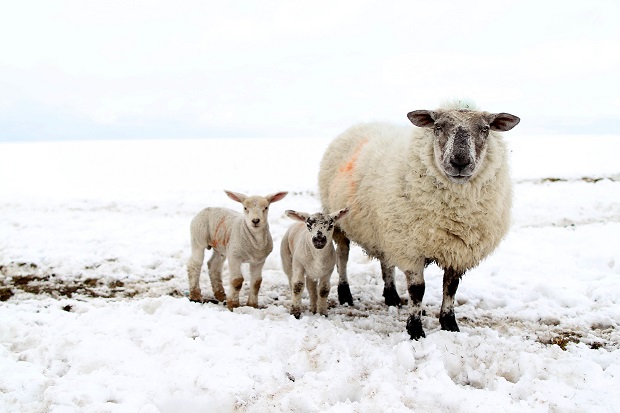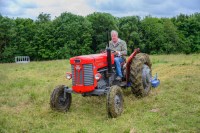Would England be the same without the sight of sheep grazing on its ‘green and pleasant land’? Most likely not; but, then again, that might not be a bad thing. That is George Monbiot’s view.
Spectator readers will already know what Monbiot thinks of the humble sheep. Last summer he wrote about how we ‘pay billions to service a national obsession with sheep, in return for which the woolly maggots kindly trash the countryside’. ‘Britain’, he wrote, ‘is being shagged by sheep’.
BBC Countryfile took up the subject of sheep hill farming (Monbiot’s chief bugbear) on Sunday night. This method of farming has its fair share of controversies. For starters, it is heavily subsidised by the government and the EU. Many environmentalists, Monbiot included, also blame it for destroying the natural environment of the uplands, and transforming them into the ‘bowling green monoculture’ that we see today. The uplands are a prime target for Monbiot’s ‘rewilding’ plan, which involves returning much of the UK’s farmland to a ‘natural’ state, and reintroducing many of the species that disappeared hundreds or thousands of years ago (lynx, bison, wolves and bears). Monbiot also claims that the grazing of sheep on uplands contributes to flooding, as the vegetation removed by the sheep would absorb the run-off water. (It is, perhaps, bad timing to mention flooding, given that many farmers across the country – and especially in south and south west England – are suffering after weeks of flooding, which could have dramatic effects on their business in 2014.)
Unsurprisingly, this attitude to ‘woolly maggots’ doesn’t go down well with people who depend on sheep for a living. And those people deserve support: forty per cent of our food is imported (which includes a fair amount of New Zealand lamb), so we ought to be encouraging British farmers, not restricting their grazing for the sake of long-vanished wild animals. The MP Rory Stewart, whose Cumbrian constituency includes a large hill farming community, argued on the programme that ‘something really weird’ is happening:
‘A group of intellectuals are imposing their fantasies on this landscape, and their fantasy is that they’re living in a wilderness, and they’re trying to create a landscape that hasn’t existed here for 3,000 years. I think it’s a tragedy. There’s a place for bits of forestry, and a place for bits of bird sanctuary. But we have to protect the human.’
Such accusations are often levelled at Monbiot. His plans to ‘rewild’ the countryside have been met with a mixture of amusement and bemusement by many who live and work in these areas. But could the two aims — re-naturalised habitats, and hill farming — exist alongside one another? It’s hard to imagine: sheep and wolves are not bedfellows. Perhaps schemes such as this one in Snowdonia, which allows upland habitats time to recover from animal grazing, are the answer. But a constant battle between environmentalists and farmers almost certainly won’t solve the problem.







Comments